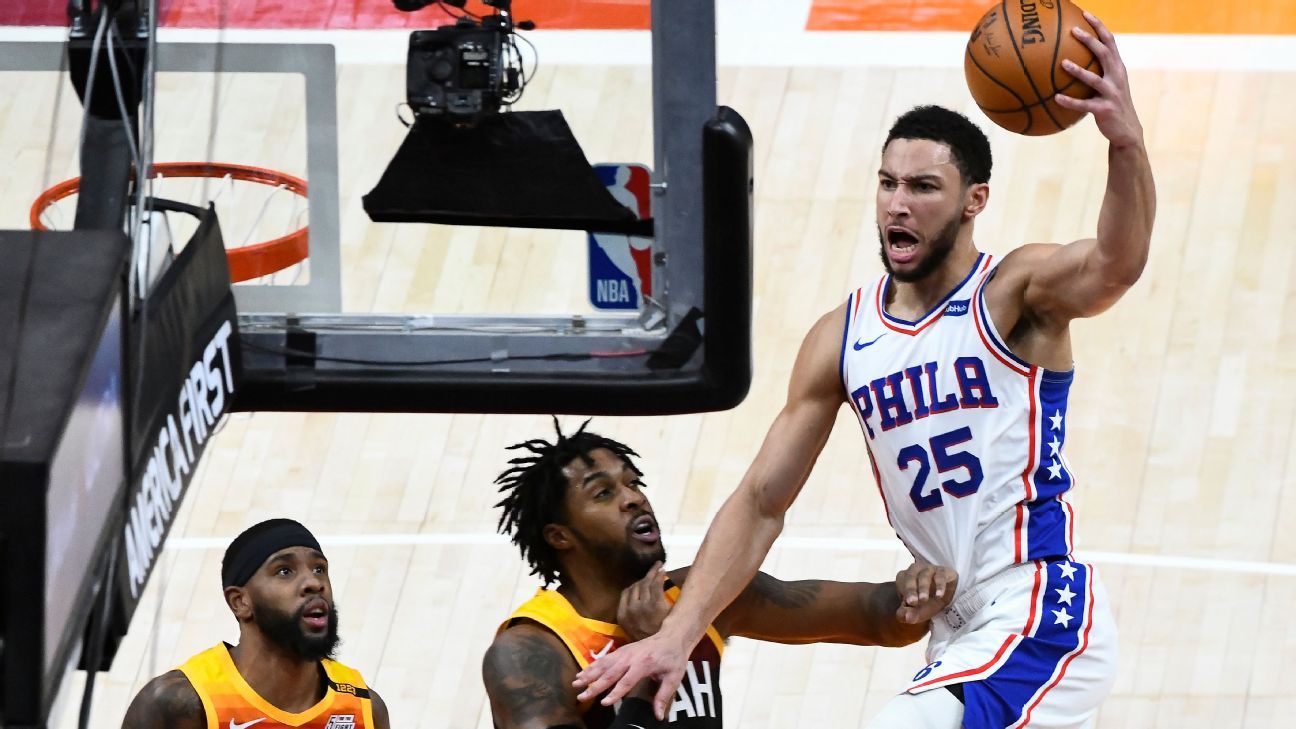Winston Churchill once said of Russia, “It is a riddle wrapped in a mystery inside an enigma.” If there is an NBA equivalent to that quote, it is Philadelphia 76ers star Ben Simmons.
There might not be a more confounding player in the NBA than Simmons. He has the size and strength of a center but plays with the speed and passing vision of a point guard. He can run and is able to guard all five positions on the court in a way that, arguably, no one else in the league can.
Yet at the same time, he won’t shoot 3-pointers — or often even midrange jump shots. And for all of the things he does to help winning, his fit offensively has become an endless source of debate in Philadelphia and beyond — especially playing alongside Sixers star center Joel Embiid.
Case in point: On Monday night, with Embiid a late scratch due to back tightness, Simmons lined up at center for the Sixers at the Utah Jazz, the team with the best record in the NBA.
So what did Simmons do? Have the best game of his career, putting up a career-high 42 points to go with 9 rebounds and 12 assists — all while not taking a single shot outside the paint.
Ultimately, the Jazz prevailed, beating the Sixers 134-123 to claim the 19th victory in their past 20 games.
The story, however, was Simmons playing with the kind of aggression Sixers fans rarely see.
“I mean, if you put it that way, probably not,” Simmons said with a smile, when asked if he has ever been that aggressive offensively in his NBA career.
“There’s nights where I feel like I am dominant, but it may not look like a 40-point game. I might have a triple-double and we might win by 20, whatever the case is. It might be on defense. [But] yeah, I definitely had to pick up the slack with Joel out.”
Simmons is right. His game is so often about doing things that don’t show up in the box score, be it the way he is able to lock down elite scorers on the other teams or set up his teammates for wide-open 3-pointers.
But the reason Monday’s performance was so eye-opening is that, despite his prodigious physical gifts, Simmons rarely imposes his will on the game like he did against the Jazz, particularly in the first quarter. As Philadelphia raced out to a 42-35 lead, Simmons finished the quarter with 19 points and four assists, and he either scored or created 12 of Philadelphia’s 16 baskets.
Through his first 24 outings this season, Simmons had scored at least that many points in an entire game three times. On Monday night, he did it in the first 12 minutes — all while going up against Jazz center Rudy Gobert and, at times, by scoring right over the league’s best defensive player.
“We anticipated, once Joel was scratched, we were trying to create a lineup where Gobert would guard Ben,” Sixers coach Doc Rivers said. “That happened, and the key for us was getting stops and getting it to Ben and getting it up the floor.
“It just felt there was no way anybody was going to stay with him, especially a center. So I thought Ben handled that very well.”
Monday’s loss was the third straight for Philadelphia, which still remains on top of the Eastern Conference thanks to recent struggles from the other contenders. But in those three losses, Simmons has slowly looked to be more aggressive offensively. While that was clearly the case in Salt Lake City, he scored 23 points in Thursday’s loss at the Portland Trail Blazers — his previous season high — and followed that up with 18 points in Saturday’s loss at the Phoenix Suns.
Simmons had scored only as many as 18 points in a game twice all season before the Portland game. Now, he has done so in three straight.
And according to Simmons, that trend isn’t an accident.
“Honestly, I’ve been working on my mentality, my mental [game], a lot these past few weeks,” Simmons said. “I think my mindset … it’s not easy to do that, to change the way you play or certain things in the game that come natural to certain people.
“I feel like I’m figuring it out. Obviously, my scoring has been a lot higher the past five, six games. So as long as I can keep doing that and stay locked in and keep working on my mental [game], I think it’s scary.”
Over the past few seasons, there has been endless scrutiny of Simmons’ game — including the lack of a jump shot or the times he will disappear within Philadelphia’s offense.
As a result, nights like Monday, when Simmons was the best player on the floor, are all the more puzzling. Why, if he’s able to do this one evening, is he unable to do so more regularly? His previous coach, Brett Brown, openly pleaded with him to shoot 3-pointers. And he did — about once a month. Rivers has gone the other way.
The obvious question, in the wake of Monday’s performance — and Embiid’s absence — is whether Simmons can produce like this when playing alongside the league’s best interior scorer. According to Philly forward Tobias Harris, Simmons delivered that performance because the Sixers needed him to.
“Ben’s a guy, he pretty much evaluates the game as he’s playing, and you could see it immediately at the beginning of the game: He knew he could get by those guys with his speed. And we just started finding different ways to get him involved,” Harris said.
“I saw him working on some things, and that was getting in the post and using his body down there [against players who] probably aren’t as busy as him and shooting over them. It’s just an evolution of his game continuing to come together game after game, and he also just had that mindset today.”
“He wanted to do whatever he could to help us win tonight,” Harris explained. “And that was it, more than anything.”
For the Sixers to be a championship-level team, they’ll need the version of Simmons that showed up against the Jazz to be there when he is playing alongside Embiid. Before Monday night, however, it was unclear if Simmons was capable of putting up this kind of performance.
Now that he has done so, the question shifts to when — or if — he will do it again. So it goes for the NBA’s ultimate enigma.

